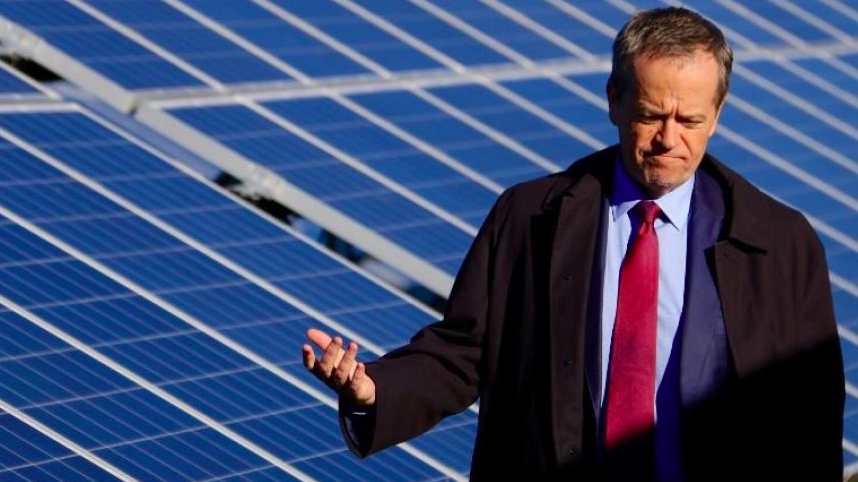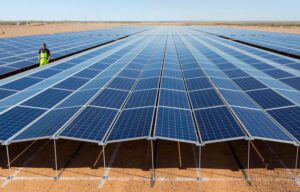Labor has vowed to end the chaos of climate policy in Australia, unveiling a suite of detailed measures that will underpin its 45 per cent emissions reduction target by 2030, and largely adopting and embracing the plan that the Coalition would not allow their former leader and prime minister Malcolm Turnbull to do.
The big “new news” in Labor’s suite of measures is a 50 per cent target for new vehicle sales (2030) and for government fleets (2025), as well as fuel emissions standards for all vehicles, which is already being branded as a new “electric Bill” by the Murdoch media, even though it will likely save the average driver $500 a year on fuel.
The remaining package is largely as expected – confirmation of the 50 per cent renewable energy target, a tightening of the so-called “safeguards mechanism” and a broadening of its reach to capture more business, and the use of carbon credits for these business and access to international markets.
This is seen as a logical and sensible expansion and tightening of a Coalition policy that was seen as effectively useless, because the safeguard mechanism had no bite.
In fact, it allowed industry to lift emissions by more than they were being reduced by the discredited emissions reduction fund. As a result, industrial emissions jumped 17 per cent jump under the Coalition government, and official forecasts suggest it will continue to rise until 2030.
Crucially, Labor has rejected the use of Kyoto surplus credits to meet its emissions reduction target, a key point of difference with the Coalition, which wants to use the surplus to meet its own weak target of a 26 per cent reduction in emissions by 2020, even though virtually every other country has decried the use of what critics say amounts to “dodgy accounting”.
The Coalition’s climate approach going into the election – expected to be called this week for sometime in May – has been to limit its own target to a 26 per cent cut in emissions, without actually saying how it will get there, apart from a $2 billion extension to the ERF.
Its main focus has been on re-booting the Abbott-era climate scare campaign, using a debunked study from economist Brian Fisher that predicts a $1.2 trillion cost to the economy from Labor’s climate target and digging up crazy new predictions such as the end of sausage sizzles, $100 meat trays and the decimation of Australia’s cattle herd.
The conservatives are already describing the Labor policy as a new carbon tax, and a “loopy” plan, according to energy minister Angus Taylor. Companies will be allowed to trade surpluses, and buy up credits if they face a shortfall, particularly as the baselines tighten over time.
Much of the political debate will focus on definitions.
“There will be no carbon tax, carbon pricing mechanism, or government revenue,” Labor insists.
The conservatives won’t be derailed from their carbon pricing scare tactics, and have already branded it a carbon tax. Labor might point out that Australia already has a carbon trading scheme, with credits known as ACCU’s, which was introduced by the Coalition via the ERF.
The document does say that companies will be allowed to access international markets.
 But there is now a question of whether Australian companies will do that because the cheap – and controversial – Clean Developement Mechanism that once offered rock-bottom prices is now not recognised by most countries, and carbon prices in other jurisdictions are mostly higher than the cost of abatement in Australia, as Reputex observes. (And see graph above).
But there is now a question of whether Australian companies will do that because the cheap – and controversial – Clean Developement Mechanism that once offered rock-bottom prices is now not recognised by most countries, and carbon prices in other jurisdictions are mostly higher than the cost of abatement in Australia, as Reputex observes. (And see graph above).
In effect, the safeguards mechanism now becomes a baseline and credit scheme and works more like the renewable energy target than a carbon pricing scheme. But will only affect around 0.1 per cent of companies.
Other elements of the Labor policy are a re-boot for the Climate Change Authority, the widely respected and once clearly independent organisation that gave advice on climate targets and policy options.
The CCA became an immediate target for the Abbott government. It couldn’t scrap the authority but it effectively chased away the original board, stacked it with sympathetic directors and then completely ignored the much respected advice that it had previously delivered.
“Ignoring climate change isn’t the answer,” Labor says in its policy document. “Real action on climate change isn’t just about protecting our environment – it’s about future-proofing our economy and protecting jobs.”
“The Liberal Party is full of climate sceptics and hopelessly divided on climate change – Scott Morrison even brought a lump of coal into Parliament instead of a climate policy,” it notes.
“The Liberals have helped push up power prices by having 13 different energy policies, undermining investment in renewable energy, supporting taxpayer money for new coal plants and backing power privatisations.
“There is only one major political party serious about real action on climate change – Labor. That’s because we are determined to pass on a better deal to the next generation.”
The Greens, of course, beg to differ, proposing a 100 per cent renewables target by 2030, and a zero emissions target by 2040 – not far different from what the Democrats are proposing in the US with their Green New Deal.
The reaction to the Labor policy has been mostly positive. Analysts Reputex go into the implications here in detail, while environment groups describe it as sound, but they still want greater ambition.
“While Labor’s policies are a significant step forward and far more credible than the Coalition’s lacklustre efforts, the level of ambition of both major parties is still short of what scientific bodies like the Intergovernmental Panel on Climate Change say is necessary to halt climate damage,” the Australian Conservation Foundation said.
“The major parties also continue to have damaging blind spots on the critical need to transition away from polluting coal and to stop Adani.”
Greenpeace agreed.
“The ALP’s proposed package marks a clear pivot away from the borderline climate denial of the Abbott, Turnbull, and Morrison governments, and a step towards an adult approach to climate change,” CEO David Ritter said.
“We are particularly encouraged that the ALP is engaging in critical policy areas like energy efficiency, electric vehicles, and land clearing. We also commend the ALP for ruling out use of Kyoto credits.
“Of course, the glaring gap in this package is around the mining and burning of coal and other fossil fuels, which is by far the largest contributor to climate pollution in Australia. It will be critical that the next government of Australia – whether Labor Liberal – outlines a vision for a clean Australia that has left fossil fuels behind.”







